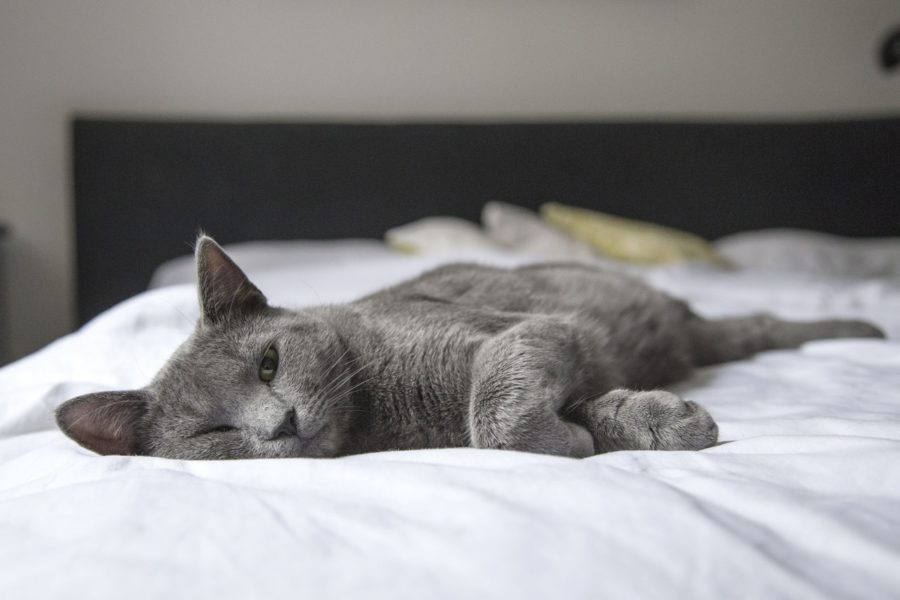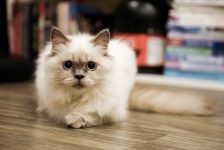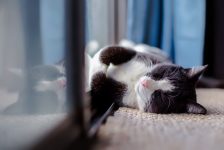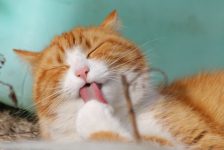Once your beloved cat reaches senior age, you will need to make changes to his diet and physical activity.
This should come as no surprise, since a senior cat’s nutrition and exercise requirements are far different from those of a young cat. At this time, health issues can start to emerge, so you need to be observant when it comes to your pet’s behaviour.
When is a cat truly considered elderly?
Generally, most cats reach their senior status between 11-14 years of age. According to the American Association of Feline Practitioners (AAFP), below are the various life stages for cats according to age ranges:
⦁ Seven to 10 years: Mature to middle-aged
⦁ 11 to 14 years: Senior
⦁ More than 15 years: Geriatric
You should know what to expect at every life stage of a senior cat as some will become less active with age. As a result, they become couch potatoes and gain weight. Obesity is a huge health issue, especially for senior cats who have less energy to do daily exercise.
Schedule regular vet visits
Your vet needs to examine your cat at least once every six months to check for any hidden or apparent diseases. By performing regular examinations, the vet will be in a better position to immediately detect a disease before it becomes too costly to treat.
During every visit, ask the vet to perform a body condition evaluation to determine whether your cat is underweight, overweight, or at an ideal weight.
You can also ask the vet to teach you how to evaluate your feline’s body condition at home on your own.
Monitor your cat’s behaviour
Since you don’t speak cat, it’s impossible for your feline friend to tell you if they are feeling sick. Moreover, most felines are quite adept at hiding any signs of illness.
Considering that your pet ages much faster than you do, it’s crucial that you pay close attention to any signs of injury or illness in between vet visits, such as:
⦁ Unexpected weight loss or gain
⦁ Changes in grooming or litter box habits
⦁ Aggressive behavioural problems
Any sudden or unusual changes in your pet may be a sign of a major health issue. Contact your vet for advice regarding your cat’s condition to rule out problems as soon as possible.
Feed a diet with adequate nutrients
Your senior cat may still look young, but that doesn’t mean you should keep his bowl full of the same cat food he’s always eaten. Depending on your feline’s health condition, his diet may need an extreme overhaul.

⦁ Work with your vet – Your vet can tell you how to achieve nutritional balance for your senior cat. Select foods according to your vet’s recommendation to ensure optimum health for your pet.
⦁ Read labels on food packages – Make it a habit to check the nutritional information on cat food. It should contain ingredients suitable for your senior cat.
⦁ Use portion control – If your senior cat needs to maintain, gain, or lose weight, you have to measure the amount of food you give. As your senior cat’s energy levels and calorie needs change, you need to keep adjusting how much you feed him.
Should you give supplements?
If you are able to provide a balanced diet for your cat, then he may no longer need supplements. However, there are some health conditions, which affect senior cats, that make it difficult for them to absorb certain nutrients or vitamins.
In cases of nutritional deficiency, your vet can recommend a specific type of supplement.
Provide special accommodations
Senior cats with an illness like arthritis may need cat litter boxes with lower sides so they can access the box easily.
By providing soft bedding for your senior cat, you can help him become more comfortable when resting at his current age.
Do make sure that food and water are accessible, as you shouldn’t force a senior cat to go up and down the stairs just to eat.
Keep up with good grooming and hygiene
Don’t think that just because your pet gets frequent vet exams, you can skip on certain aspects of your routine care. As your cat ages, regular grooming and hygiene become more important. Dental cleaning as well as bathing and brushing your cat’s hair regularly still contribute to your pet’s good health.
Encourage physical activities
Let your cat get into the habit of exercising daily. However, don’t forget to be reasonable in your expectations regarding the duration and intensity of every physical activity.

The following can help keep your senior cat entertained as well as help him burn extra calories and keep joints and muscles healthy:
⦁ Cat interactive toys
⦁ Supervised access to the outdoors
⦁ Cat leash walking
⦁ Installation of steps and ramps
It may take some persuading to keep your senior cat active. But once he develops the habit of exercising, it’s well worth the effort.
Be patient and give your cat the love he deserves
Your senior cat needs your love, patience and affection. He may no longer be the young, hyperactive feline you used to know, so you need to be extra sensitive to his needs. Being a pet parent means you have to be responsible for your animal friend’s well being throughout all his years here in this world.






